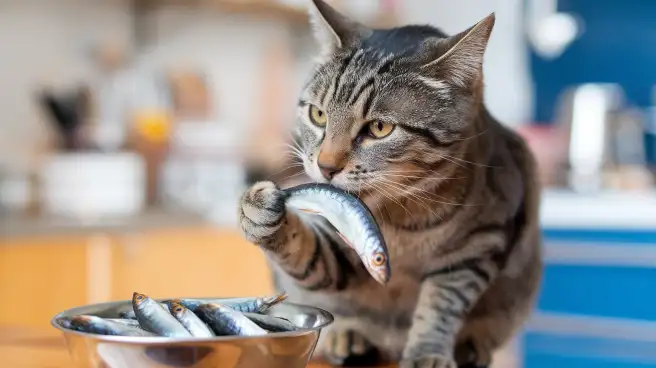Cats can have sardines as a tasty treat. Sardines are small, oily fish that are rich in nutrients. They provide protein, omega-3 fatty acids, and vitamins. But it’s important to give them in moderation.
Wondering if sardines are safe for your cat? You’re not alone. Many cat owners want to know if this fishy snack is a good idea. Keep reading to find out if sardines are a healthy choice. Can Cats Have Sardines
Sardines can be a great addition to your cat’s diet. They offer essential nutrients that support your cat’s health. However, always ensure they are plain and free from added salt or spices.
Are Sardines Good for Cats? The Scoop on Scaly Snacks
When it comes to feeding sardines to cats, there are several potential benefits to consider. Sardines are rich in omega-3 fatty acids, which can promote a healthy coat and skin, reduce inflammation, and support cognitive function in cats. They’re also a great source of protein, essential for maintaining muscle mass and overall health in our feline friends.
However, it’s important to remember that while sardines can be a nutritious treat, they shouldn’t replace a balanced cat food diet. Sardines and cat nutrition should go hand in hand, with the fish serving as an occasional supplement rather than a staple. Always consult with your veterinarian before making significant changes to your cat’s diet.
Which Oils Are Safe for Cats? Navigating the Slippery Slopes
When considering sardines for cats, it’s crucial to pay attention to the oil they’re packed in. Not all oils are created equal when it comes to feline health. Sardines in water are generally the safest option, as they don’t come with added fats that could upset your cat’s stomach or contribute to weight gain.
If you’re looking at sardines in oil, opt for those packed in fish oil, which can provide additional omega-3 benefits. Avoid sardines packed in vegetable oils like sunflower oil, olive oil, or soybean oil. While these oils aren’t toxic to cats, they don’t offer the same nutritional benefits and may cause digestive upset in some felines.
Are Other Sardine Additives Safe for Cats? The Hidden Hazards
When it comes to canned sardines for cats, it’s not just about the fish itself. Many canned sardines come with additives that could be harmful to your feline friend. Salt is a common additive that can be dangerous for cats in large quantities. Too much salt can lead to sodium poisoning in cats, which can cause symptoms ranging from excessive thirst to seizures in severe cases.
Spices and flavorings are other additives to watch out for. While humans might enjoy sardines with a kick of spice, cats’ digestive systems aren’t equipped to handle these extras. Always opt for plain sardines without any added seasonings or sauces. This includes avoiding sardines in tomato sauce, as tomatoes can be harmful to cats and the sauce often contains additional spices and salt.
Can Cats Eat Canned Sardines? The Tinned Truth

Canned sardines can be a convenient option for treating your cat, but not all canned varieties are created equal. When choosing canned sardines for cats, look for options that are packed in water and don’t contain any added salt or preservatives. These will be the safest and healthiest choice for your feline friend.
It’s also important to consider the mercury levels in fish for cats. While sardines are generally low in mercury compared to larger fish like tuna, it’s still a factor to keep in mind, especially if you’re feeding sardines regularly. Always opt for sardines from reputable sources and vary your cat’s diet to minimize any potential mercury exposure.
How Much Sardines is OK for Cats? Portion Control for Picky Eaters
When it comes to feeding sardines to cats, moderation is key. While sardines can be a healthy treat, they shouldn’t make up more than 10% of your cat’s daily caloric intake. For most cats, this translates to about one or two small sardines per week. Remember, every cat is different, and factors like size, age, and overall health can affect how much sardine is appropriate.
It’s also important to introduce sardines gradually into your cat’s diet. Start with a small piece and observe how your cat reacts. Some cats may experience digestive upset when trying new foods, so keep an eye out for any signs of discomfort. If your cat tolerates sardines well, you can slowly increase the amount, always staying within the recommended limits.
Are Sardines Better in Water or Oil? The Great Debate
When it comes to choosing between sardines in water or sardines in oil for cats, water is generally the safer bet. Sardines packed in water retain their natural nutrients without adding extra fats or calories to your cat’s diet. They’re also less likely to cause digestive upset or contribute to weight gain.
However, if you do opt for sardines in oil, choose those packed in fish oil rather than vegetable oils. Fish oil can provide additional omega-3 fatty acids, which are beneficial for your cat’s health. Just remember to drain the oil before feeding, as too much can lead to diarrhea or other digestive issues in cats.
Is It Okay to Feed My Cat Canned Tomato Sardines? The Saucy Situation
When it comes to canned sardines in tomato sauce for cats, the answer is a firm no. While plain sardines can be a healthy treat for cats, those packed in tomato sauce pose several risks. Tomatoes contain solanine, a compound that can be toxic to cats in large quantities. Additionally, tomato sauce often contains added salt, spices, and other ingredients that aren’t suitable for feline consumption.
Moreover, the acidity of tomato sauce can upset your cat’s stomach, potentially leading to vomiting or diarrhea. If you’ve accidentally fed your cat sardines in tomato sauce, don’t panic, but do monitor them closely for any signs of discomfort or illness. In the future, stick to plain sardines packed in water for a safer treat option.
Other Canned Fish Options for Cats: Beyond the Sardine

While sardines can be a great treat for cats, they’re not the only fish in the sea when it comes to feline-friendly options. Other canned fish options for cats include tuna, salmon, and mackerel. These fish can provide similar nutritional benefits to sardines, including high protein content and omega-3 fatty acids.
However, it’s important to remember that each type of fish comes with its own considerations. For example, tuna is higher in mercury than sardines, so it should be fed even more sparingly. Salmon can be a great source of omega-3s, but like sardines, should only be given in moderation. Always choose canned fish packed in water rather than oil or brine, and avoid any options with added flavorings or preservatives.
Is Canned Sardines Better Than Canned Tuna for Cats? The Tinned Throwdown
When comparing sardines vs. tuna for cats, sardines often come out on top. While both fish can be nutritious treats for cats, sardines have several advantages. Firstly, sardines are generally lower in mercury than tuna, making them a safer option for regular consumption. They’re also typically smaller fish, which means they’re less likely to contain high levels of environmental toxins.
Sardines are also richer in omega-3 fatty acids than tuna, particularly EPA and DHA, which are beneficial for your cat’s skin, coat, and overall health. Additionally, sardines often contain edible bones, which can provide a good source of calcium for cats. However, it’s important to note that while sardines may have these advantages, neither should replace a balanced, complete cat food diet.
Additional Tips for Feeding Sardines to Cats: Fin-tastic Advice
When it comes to introducing sardines to a cat’s diet, start slow and small. Begin by offering a tiny piece of sardine and observe how your cat reacts. Some cats may take to sardines immediately, while others might need time to adjust to the new taste and texture. Always supervise your cat when introducing any new food to their diet.
It’s also important to consider the preparation of the sardines. While many cats can handle small, soft bones found in sardines, some pet owners prefer to err on the side of caution by removing bones from sardines for cats. If you choose to do this, be thorough to prevent any choking hazards. Also, always serve sardines at room temperature – cats generally prefer their food not too hot or cold.
Considerations for Feeding Sardines to Your Cat: Think Before You Sink

Before making sardines a regular part of your cat’s diet, there are several factors to consider. First, while rare, some cats may have allergies in cats due to sardines. Watch for signs of allergic reactions such as itching, swelling, or digestive upset. If you notice any of these symptoms, discontinue feeding sardines and consult your veterinarian.
Another consideration is the potential for weight gain. Sardines are relatively high in calories, so overfeeding can lead to obesity in cats. This is especially important for indoor cats or those with less active lifestyles. Always adjust your cat’s regular food intake to account for the extra calories from sardines. Lastly, if your cat has any existing health conditions, particularly kidney or heart issues, consult with your vet before adding sardines to their diet.
Conclusion
Cats can have sardines as a tasty and nutritious treat. Sardines are rich in protein, omega-3 fatty acids, and vitamins that support your cat’s health. However, it’s important to choose the right type of sardines. Sardines packed in water are the best choice because they don’t have extra oils or harmful additives. Always feed sardines in moderation to avoid overloading your cat with too many nutrients.
When you offer sardines to your cat, make sure to avoid those packed in tomato sauce or other strong flavors. These can upset your cat’s stomach. Stick to plain, canned sardines in water. This way, you can give your cat a healthy snack without any risks. Remember, sardines should be an occasional treat, not a regular meal.
FAQs
Are canned sardines OK for cats?
Yes, canned sardines are OK for cats if they are packed in water without added salt or seasoning. They should be given in moderation as a treat.
What canned fish can cats eat?
Cats can eat canned sardines, mackerel, and salmon packed in water. Avoid fish packed in oil, brine, or with added flavors.
What fish is best for cats?
The best fish for cats includes salmon, sardines, and tuna, especially when cooked and served plain without seasoning or bones.
Can Persian cats eat sardines?
Yes, Persian cats can eat sardines. They are a good source of protein and omega-3 fatty acids, but should be given in small amounts.

Aledon is the author at Bunny Eating, specializing in pets. With a deep understanding of pet breeds, behavior, food, and health, Aledon provides expert advice and valuable insights to help you care for your furry friends.











